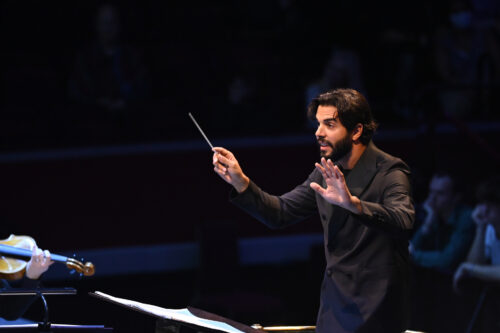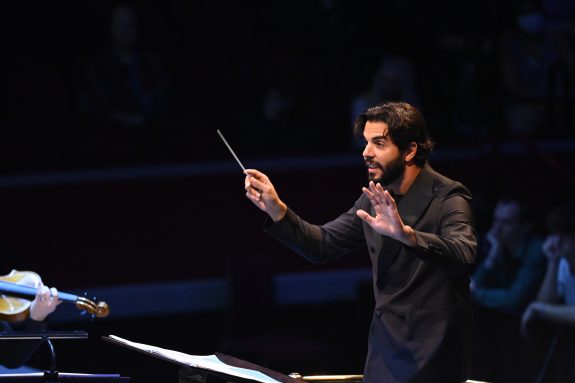
 United Kingdom BBC Proms 2021 [23] – Mason, Dvořák, R. Strauss, Hindemith: Sheku Kanneh-Mason (cello), Royal Liverpool Philharmonic Orchestra / Domingo Hindoyan (conductor). Royal Albert Hall, London, 6.9.2021. (CC)
United Kingdom BBC Proms 2021 [23] – Mason, Dvořák, R. Strauss, Hindemith: Sheku Kanneh-Mason (cello), Royal Liverpool Philharmonic Orchestra / Domingo Hindoyan (conductor). Royal Albert Hall, London, 6.9.2021. (CC)

Grace-Evangeline Mason – The Imagined Forest (2021, world premiere)
Dvořák – Cello Concerto, Op.104 (1894/5)
R. Strauss – Don Juan, Op. 20 (1888-9)
Hindemith – Symphonic Metamorphoses of Themes by Weber (1943)
The stream of Domingo Hindoyan’s first concert as Chief Conductor Designate of the Royal Liverpool Philharmonic was highly impressive (click here); as was his recent performance of extended highlights from Bellini’s I puritani at the Gstaad Festival in Switzerland. Hindoyan is now fully at the helm of the RLPO, and what a way for him to make his BBC Proms debut, in a fascinating programme that included a rare concert performance of the Hindemith Symphonic Metamorphoses and included a world premiere by the 2013 winner of the BBC Young Composers Competition, Grace-Evangeline Mason (born 1994).
And it is with that premiere we started (albeit after a delay, not announced at the Royal Albert Hall but acknowledged on the BBC relay), Grace-Evangeline Mason’s The Imagined Forest of 2021: so the ink still wet, presumably. Inspired by the work of the Berlin-based artist Claire Celeste Börsch, whose art shows imagined worlds with fantastical flora and fauna, Mason’s work itself inhabits an otherworld of its own. Mason is a supreme painter in sound. Straight from the gossamer opening, it was clear that this evocation of enchantment would be sonically seductive; Mason also has a fine grasp of structure however, so what we got was a satisfying 11 minutes or so in which vivid impressions of Nature herself, full of energy, are pitted against still plateaux (representing ‘expansive clearings,’ apparently). Hints of English pastoralism were skilfully integrated within a larger harmonic palette. Mason’s mode of composition is, in her own words, ‘highly intuitive’, and perhaps that is reflected in the post-Impressionist sensuality of that opening. The initial trumpet gesture acts as a reference (the piece ends with this gesture also); and there is a sense of additive textures towards a climax, so this intuitive approach is clearly not of the pure stream-of-consciousness kind. Hindoyan sculpted the performance beautifully, allowing the music its warp and weft; a special mention, too, for the violin solos of the RLPO’s leader, Thelma Handy. The evocative writing reminded us that the forest is often a representation of the unconscious or subconscious in literature and painting, a place of dreams and nightmares.
The match of emotion and intellect with highly skilful orchestration in Mason’s piece is a winning one. A most memorable work.
Cellist Sheku Kanneh-Mason needs no introduction, and here he played a Proms favourite: the Dvořák Cello Concerto. Given that Sheku is a Proms favourite himself, it might be sacrilege to claim that the true star of this performance was Hindoyan and his orchestra, but there is no getting away from the orchestral excellence of the first movement exposition, the beautiful horn solo, the overarching sense of discipline, the superb woodwind tuning. A point needs to be made, also, in the difference between in-house sound and BBC Radio 3 sound; in the broadcast, Kanneh-Mason sounds reedy and thin, and while it is true he does not have the all-embracing presence of a Mstislav Rostropovich in this concerto, he doesn’t sound like the thousands of radio listeners heard him. Kanneh-Mason also makes his cello sing beautifully (the second subject, the epitome of cantabile, of the Adagio)
Actually, the slow movement was the highlight of the performance, the pair of clarinets singing gloriously, Kanneh-Mason’s interactions finely calibrated. His blanched tone sat in high contrast to the RLPO’s powerful, burnished brass, while the trio of horns acted as one beautifully creamy unit. Lovely to hear some true pianissimi from both soloist and orchestra, too, and how the orchestra set up the impetus for the Finale. Like the first movement, though, Mason felt somewhat disengaged again here; the ear was led more to the orchestra than the soloist on many occasions.
An encore was expected, and duly delivered: an all-pizzicato rendition of I Say a Little Prayer by Burt Bacharach and Hal David (originally written for Dionne Warwick, but Kanneh-Mason’s arrangement was inspired by Aretha Franklin’s rendition). Mesmeric stuff, daringly quiet at times.

The second half was pure delight. Strauss’s Don Juan, a piece perfect for the Proms in its swashbuckling gait and technicolour scoring, was given an almost chamber music performance by the RLPO from the perspective of the level of detail that came through. Hindoyan dared to begin the piece without upbeat – an indication of trust in his orchestra, and how the strings delivered in their unanimity of attack. Contrast is at the heart of this piece, and in this performance, moods turned on a sixpence. Again Handy, their leader, deserves mention for her superb solos, along with the warm-toned oboe (Jonathan Small). Fascinating, too, how Hindoyan clearly wanted the quietest pianissimo as part of the work’s sonic palette: and got it. The respect between orchestra and conductor here is palpable, strings impeccably disciplined, horns heroic and blissfully split-free. A word, too, on what Hindoyan is already achieving at Liverpool as one can hear, continuously, a splendid clarity of texture and superbly balanced sound. Think the clarity of the BBC Philharmonic, but with a more balanced bass (the BBC Philharmonic so often sounds bass-light). The future bodes well for this orchestra.
Finally, a welcome outing for Hindemith’s Symphonic Metamorphoses of Themes by Weber, which originated in an aborted ballet project of 1940. Hindoyan in interview stated that there is an American influence on this piece (resulting from the composer’s admiration for the American orchestras), and Guy Rickards in his programme notes posits an influence of the ‘muscular polyphony’ of Roy Harris in the second movement.
For those that think Hindemith is all Gebrauchsmusik (‘utility music’) and unrelentingly serious, this piece comes as a splendid corrective. While the material on which the music is based might not be the most familiar (not a Der Freischütz in sight; instead, themes from piano duets, and the Chinese Overture for the second movement, Scherzo Turandot). The playing in each of the four movements was wonderfully characterful (no missing the Orientalisms of that Scherzo Turandot). That sonic profile of the orchestra mentioned above is perfect for this music, where everything must be heard (and there is nowhere for anyone in the orchestra to hide). The sheer cleanliness of the performance was miraculous, as was Hindoyan’s grasp of the gestural nature of the score. It was fabulous to hear the magnificent bells the RLPO brought with them as part of their clearly massive array of percussion, too. There was lyricism herein the Andantino, relaxed with lovely clarinet (Nick Carpenter) and horn (Timothy Jackson) solos and flute filigree (Cormac Henry). The finale (Marsch) could hardly have been more different, magnificently riotous and with the RLPO’s brass on top form at the opening (and how disciplined rhythmically this was!).
A triumph for all concerned, and the dawn of a new era that will surely see the Liverpudlian orchestra continue its rise towards the top of the UK’s classical ensembles. On the showing of both this and the streamed RLPO concert, Hindoyan’s programming is another of his strengths. We should watch this partnership closely.
Colin Clarke
